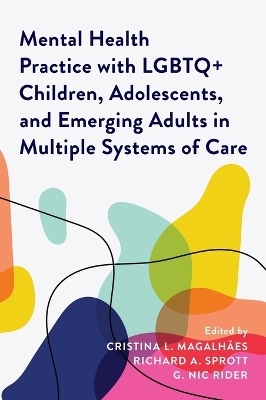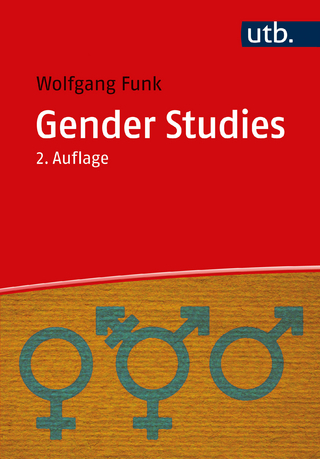
Mental Health Practice with LGBTQ+ Children, Adolescents, and Emerging Adults in Multiple Systems of Care
Rowman & Littlefield (Verlag)
978-1-5381-5446-5 (ISBN)
This book provides an overview of risk and protective factors for lesbian, gay, bisexual, transgender, and queer (LGBTQ+) youth and emerging adults to inform the clinical practice of mental health professionals who work with this population. Documentation of LGBTQ+ health disparities is well-established, but much of that work has focused on adults. Additionally, while there has been a greater push for the integration of mental health practice with general healthcare delivery in recent years, there are few resources for educating mental health professionals on how to work within interdisciplinary teams to address the psychological, physical, and behavioral health care needs of LGBTQ+ people. This book addresses gaps in the literature, such as the needs of young age groups and integration of physical and mental approaches to care, which have traditionally been neglected in the health disparities literature for psychologists and other mental health professionals. This book is grounded in Minority Stress Theory, as well as multicultural, intersectional, and positive youth development frameworks. It emphasizes holistic health perspectives, integrated care approaches (of mental health with general health service delivery), and interdisciplinary team efforts targeting both the psychological and physical health needs of children, adolescents, and emerging adults.
Cristina L. Magalhães, PhD, LMHC, is associate director and professor of clinical psychology in the Health Emphasis of the Clinical PsyD Program, Fellow of the Rockway Institute for LGBTQ Studies, and Coordinator of the Rockway Certificate in LGBTQ Psychology at the California School of Professional Psychology at Alliant International University, Los Angeles. As a clinician, Dr. Magalhães has over 20 years of experience working with couples, families, and individuals across the life span in community mental health centers, residential settings, and independent practice. She is licensed to practice as a mental health counselor in Florida, and as a psychologist in California and Rio de Janeiro, Brazil. Her research, writing, and speaking engagements have been primarily in the areas of cross-cultural assessment, anxiety and trauma related disorders, and LGBT psychology, with an emphasis on transgender health. Richard A. Sprott, PhD, teaches in the Department of Human Development and Women's Studies at California State University, East Bay and teaches graduate level courses at various universities in the San Francisco Bay Area, including UC Berkeley, the California Institute of Integral Studies, and Holy Names University. His early work was on social and language development in early childhood. In addition, he has a long history of conducting educational program evaluations for migrant farmworker families in the Midwest, which highlight the ways in which social organizations and communities help and hinder the educational achievement of migrant farmworker children. He is currently directing research projects focused on identity development and health/well-being in people who express alternative sexualities and non-traditional relationships, and issues facing homeless LGBTQ youth. He is current president-elect of Division 44 of APA: the Society for the Psychology of Sexual Orientation and Gender Diversity. All of these efforts highlight the ways in which stigma, prejudice, minority dynamics, health, language, identity development and community development all intersect and affect each other. G. Nic Rider, PhD, is an assistant professor at the University of Minnesota Medical School’s Program in Human Sexuality and Co-Associate Director of Research for the National Center for Gender Spectrum Health. Dr. Rider is also a licensed psychologist and gender and sexuality specialist with clinical and research experience examining minority stressors, health disparities, and care utilization of LGBTQ+ individuals across the lifespan. Using an intersectionality framework, Dr. Rider is particularly interested in how interlocking systems of power and oppressive experiences related to having multiple marginalized identities influence health and wellbeing for LGBTQ+ youth of color. Dr. Rider has served as a study coordinator on a NIH-funded research project which resulted in several publications that documented barriers to care and minority stressors as well as prevalence rates of risk factors, protective factors, health concerns, and health care utilization among transgender and gender diverse youth. Dr. Rider is currently Co-Chair of the Asian American Psychological Association’s Division on LGBTQ.
Introduction: Health Disparities, Resilience, and Interdisciplinary Care for LGBTQ+ Youth and Emerging Adults
(G. Nic Rider, PhD, LP, Cristina Magalhães, PhD, LMHC, & Richard Sprott, PhD)
Section I: Theoretical Approaches
Chapter 1: Minority Stress Theory and Resilience-Building Practice
(Eunice V. Avilés Faría, PhD, LMHC, LPC)
Author’s Note
Minority Stress Theory
Minority Stress Processes and the LGB Community
Minority Stress Processes and Transgender and Gender Nonbinary Individuals
Distal Stressors
Proximal Stressors
The Impact of Minority Stress on Mental Health
The Impact of Minority Stress on Physical Health
Resilience
Individual Resilience
Community Resilience
Resilience Building Practice: Interventions that can Enhance Resilience
Societal Level Interventions
Community and Group Level Interventions
Individual-Level Interventions (ILI)
Empirical Support for the Minority Stress Model
Gaps in the Literature and Future Directions for Clinically Relevant Research
Chapter 2: Intersectionality, Culturally Sensitive Care, and LGBTQ+ Youth
(Kayden J. Schumacher, MSc, MS, LSC, Leonardo E. Candelario-Pérez, PhD LP, Eunice V. Avilés Faría, PsyD, LMHC, LPC, & G. Nic Rider, PhD LP)
Practice Considerations
Advocacy Considerations
Conclusion
Chapter 3: Interdisciplinary Healthcare for Transgender Youth: An Application of the Gender-Affirmative Lifespan Approach (GALA)
(Katherine G. Spencer, PhD, LP, CST & Nova Bradford, LGSW)
Introduction to Transgender Health
History of Gender-Affirmative Healthcare for Youth
Minority Stress
The Gender Affirmative Lifespan Approach (GALA)
Philosophical Foundations of GALA
Core Components of GALA
Interdisciplinary Approach
Connections to Medical Interventions
Case Studies
Case Study A: Research - Unicorn Youth
Case Study B: Advocacy & Policy - Health Insurance Advocacy in MN
Case Study C: Clinical Example - Sexuality and Agency
Case Study D: Youth Homelessness
Conclusion
Key Knowledge Points
Recommendations for Professionals
Section II: Development Issues
Chapter 4: The Youngest Part of the Rainbow: Clinical Care for Gender Diverse Children
(Dianne R. Berg, PhD, LP*, Caroline Maykut, PhD*, Rachel Becker-Warner, PsyD, LP, Catherine Schaefer, MS, & Jennifer J. Connor, PhD, LMFT - *Co-First Authors)
Social and Historical Context of Research with Gender Diverse Children
Gender Identity Development
Mental Health in Gender Diverse Children
Clinical Implications of Mental Health Research
Resilience in Gender Diverse Children
Interpersonal Contexts
Peer Group
Family
Community Contexts
Schools
Healthcare Settings
Medical Settings
Mental Health Settings
Case Study
Andi’s Gender Journey
Sessions 1-3 Assessment: Age 4.11 – 5.0
Sessions 4-5 Feedback and Collaborative Treatment Planning with Parents Only: Age 5.1 - 5.2
Sessions 6-11 Early Therapy Process: Age 5.3 – 6.1
Sessions 12-16 Ongoing Therapeutic Process: Age 6.2 – 6.7
Sessions 17 - 24 Ongoing Therapeutic Process: Age 6.8 – 7.5
Sessions 24-35 Ongoing Therapeutic Process: Age 7.6 – 9.0
Sessions 36-44 Present Therapeutic Process: Age 9.3 – 10.5
Case Reflection
Future Directions
Key Knowledge Points
Recommendations for Practitioners and Professionals
Chapter 5: Risk and Protective Factors Among LGBTQ+ Adolescents
(Amy L. Gower, PhD, Marla E. Eisenberg, ScD, MPH, & G. Nic Rider, PhD, LP)
Interpersonal Relationships
Friendships
Romantic Relationships
Parent/Family Relationships
The School Context
Community Support
Online/Internet Support
Developmental Considerations
Case Study
Practice Considerations
Conclusions
Chapter 6: Not a Teen, Not Yet an Adult: Health Risk and Protective Factors Among LGBTQ+ Emerging Adults
(Caleb Esteban, PhD, Alixida Ramos-Pibernus, PhD, Luis X. Díaz-Medero, MS, & Astrid Irizarry-Rodríguez, MS)
LGBTQ+ Emerging Adults
Institutional Challenges
Family
College
Religious Institutions
Healthcare
Government
Interpersonal Challenges
Relationships
Marriage
Peers
Religious Affiliation
Personal Challenges
Physical Health
HIV/STIs
Healthcare
Substance Abuse
Mental Health
Depression and Anxiety
Suicide
Protective Factors for LGBTQ+ Emerging Adults
Resilience
Social Support
Community Engagement and Connectedness
Gaps and Future Direction for Studies
Clinical Implications
Case Study
Case Study Discussion
Key Knowledge Points
Recommendations for Mental Health Clinicians
Section III: Systems of Care
Chapter 7: Pre-K – 12 Schools
(Molly M. Strear, PhD, NCC & Matthew J. Beck, PhD, LCPC, NCC, ACS)
SBMHPs Working with LGBTQ+ Youth: Review of Literature
School Counselors
School Social Workers
School Psychologists
SBMHP Collaboration
Recommendations for SBMHPs
Coordination of Services Through MTSS
Tier 1 - Universal Support
Tier 2 - Supplemental Support
Tier 3 - Intensified Support
Family/Community Engagement
Implications & Future Directions
Conclusion
Key Knowledge for Students
Recommendations for Practitioners and Professionals
Chapter 8: Serving LGBTQ+ Students at University and College Campuses
(Jan E. Estrellado, PhD & Saromi Kim, PhD)
Challenges Facing LGBTQ+ College Students
Mental Health Disparities
Identity Development as a Major Task of Late Adolescence and Emerging Adulthood
Acceptance and Visibility of LGBTQ+ Students on Campus
Intersectionality and Marginalized Identities
The Need for Affirming LGBTQ+ College Student Services
Student Support Services
Relationships with Faculty
Relationships with Peers
Health Services on Campus
Gaps in Research
First-Generation Students
Bisexual and Fluid Students
Transgender, Nonbinary, and Gender Expansive (TNBGE) Students
STEM Students
Immigration Status
International Students
Clinical and Policy Recommendations When Working with LGBTQ+ College Students
University or College Counseling Centers
Coming Out
Language
Complexity of Identities
Depathologizing Symptoms
Advocacy
Policy Recommendations
Data Collection
Institutional Policies
Feedback Loops
Inclusivity
Dialogue Spaces
Intersectionality
Community LGBTQ+ Services
Community Colleges
Protective Factors
Health Providers
Counseling Centers
Academic and Career Advisors
Conclusion
Key Knowledge Points
Recommendations for Practitioners
Chapter 9: Medical Care Centers as Beacons of Hope for LGBTQ+ Youth
(Hiram Rivera-Mercado, PsyD, Kevin Carrion, PsyD, & Taymy J. Caso, PhD)
Role of Hospitals in Serving LGBTQ+ Youth and Emerging Adults
Services Included
Primary Care
Pediatric Endocrinologist
Behavioral Health and Mental Health Services
Policies and Their Function
Training of Personnel
Community Partnerships and Resources
Creating a Welcoming Environment
Physical Environment
Registration and Documentation Processes
Language and Communication
Conclusion
Chapter 10: Improving Child Welfare and Foster Care Outcomes for LGBTQ+ Youth
(Kellen Grayson, PsyD, LMFT & Mira Jourdan, PhD, ABPP)
Family Rejection, Abuse, and Homophobia
LGBTQ+ Youth and Polyvictimization
Poverty and LGBTQ+ Youth Vulnerability
Over-Representation of LGBTQ+ Youth in Child Welfare Services
The State of Foster Care and Child Welfare Systems
Policies and Practices in Child Welfare Services
Training and Oversight of Foster Parents and Child Welfare Workers
Gaps in Care
Transition-Age Youth
The Landscape for Change
Religious Freedom Restoration Acts and Child Welfare
Considerations for Clinicians
Conclusion
Chapter 11: LGBTQ+ Youth Experiencing Homelessness
(Catherine Forbes, PhD, Carrie Mounier, LCSW, & Kaitlin Venema, PhD)
Literature Review and Gaps in Research: LGBTQ+ Youth Experiencing Homelessness
Clinical Considerations and Recommendations for Practice in Mental Health and Substance Abuse Treatment
Trauma Informed Care
Interdisciplinary Programs for LGBTQ+ YEH
Evidenced-Based LGBTQ+ Affirming Therapeutic Services
Group Therapy Approaches
Alternative Programming for LGBTQ+ YEH
Medical Interventions
Structural Competency and Service Systems for LGBTQ+ YEH
Impact of Structures on Patient Health
Influence of Structures on the Clinical Encounter
Respond to Structures in the Clinic
Respond to Structures Beyond the Clinic
Structural Humility
Practice and Policy Recommendations
Healing Centered Engagement and Structural Violence
Restorative Justice and Structural Violence
Positive Youth Development and Structural Violence
Harm Reduction and Structural Violence
Gaps and Future Directions
Chapter 12: Gender Expansive and Sexual Minority Youth and the (In)Justice System
(Macy Wilson, PsyD, Jessica Ward, MA, & Roberto L. Abreu, PhD)
Incidence and Prevalence
Risk Factors
School to Prison Pipeline
“No Promo Homo” Laws and a Heterosexual-Cisgender School-Based Curriculum
A Failed Welfare System
The (Il)legal System
Disproportionate Representation
Unequal Injustice
Gender Differences
Youth of Color
Microaggressions
Mediating Factors
Mental Health Behaviors While Incarcerated
Self-Harming Behaviors
Aggression Toward Others
Toward a Socially-Just System: Ensuring Safety for LGBTQ+ Youth
Incorporating a Holistic Approach to Care
Constitutional Rights
Legal Rights of LGBTQ+ Youth in the Justice System
Recommendations
Key Knowledge Points
Chapter 13: Services for Youth and Emerging Adults at LGBTQ+ Centers and Other Community-Based Organizations
(Tangela Roberts, PhD, Zari Carpenter, MA, and Kat Schuette, MA)
Author’s Note
LGBTQ+ Youth and Emerging Adults of Color
Transgender and Gender Non-Conforming (TGNC) Youth and Emerging Adults
Challenges for LGBTQ+ Youth and Emerging Adults
Healthcare Challenges
Mental Health
Sexual Health
Interpersonal Challenges
Coming Out
Building Community
Dating and Relationships
Intimate Partner Violence
Vocational Challenges
Career Development
Employment Discrimination
Workplace Identity Management
Method
Sample of LGBTQ+ Community Centers
Results
Physical Health Services
Mental Health Services
Services for Queer Youth and Emerging Adults of Color (QYAOC)
Services for Transgender and Gender-Non-Conforming (TGNC) Youth and Emerging Adults
Emotional Support
Social Support
Services Related to the Provision of Basic Needs
Housing Stability
Food Insecurity
Services Related to Educational and Vocational Assistance
Auxiliary Services
Discussion
Areas of Improvement in Serving LGBTQ+ Youth and Emerging Adults
Availability of Services by Geographical Region
Access to LGBTQ+ Community Centers
LGBTQ+ Youth and Emerging Adults of Color
Considerations for Clinical Practice
Policy Recommendations
Chapter 14: Independent Practice
(Gary Howell, PsyD, Arlene Noriega, PhD, Julie Williams, MSEd)
Independent Practice
Solo Practices
Group Practices
Integrated Practices
Nuances with LGBTQ+ Affirmative Practices
Consultative Roles
Barriers to Care
Healthcare Disparities
Sociopolitical Factors
Social Determinants of Care
Eliminating Barriers to Care
Cultural Competence
Intersectional Approach
Centering Marginalized Voices
Advocacy
Integrated Approach
Impact of the Affordable Care Act
Impact of COVID
Successes
Challenges
Research Gaps and Future Directions
Considerations for Practice
Key Knowledge Points
Recommendations for Practitioners
Conclusion: Increasing Health and Well-Being of LGBTQ+ Youth and Emerging Adults: Lessons Learned, Questions Unanswered
(Richard Sprott, PhD, G. Nic Rider, PhD, & Cristina L. Magalhães, PhD, LMHC)
Summary of Findings and Lessons
A Possible Agenda for Research, Clinical Treatment, and Policy
More Resources and Funding
Train Mental Health Providers
Systems-Based Approach Refinement
Summary
Appendix A: List of Resources
About the Contributors
References
Index
| Erscheinungsdatum | 18.10.2022 |
|---|---|
| Reihe/Serie | Diverse Sexualities, Genders, and Relationships |
| Verlagsort | Lanham, MD |
| Sprache | englisch |
| Maße | 184 x 262 mm |
| Gewicht | 971 g |
| Themenwelt | Geisteswissenschaften ► Psychologie |
| Sozialwissenschaften ► Soziologie ► Gender Studies | |
| ISBN-10 | 1-5381-5446-3 / 1538154463 |
| ISBN-13 | 978-1-5381-5446-5 / 9781538154465 |
| Zustand | Neuware |
| Haben Sie eine Frage zum Produkt? |
aus dem Bereich


